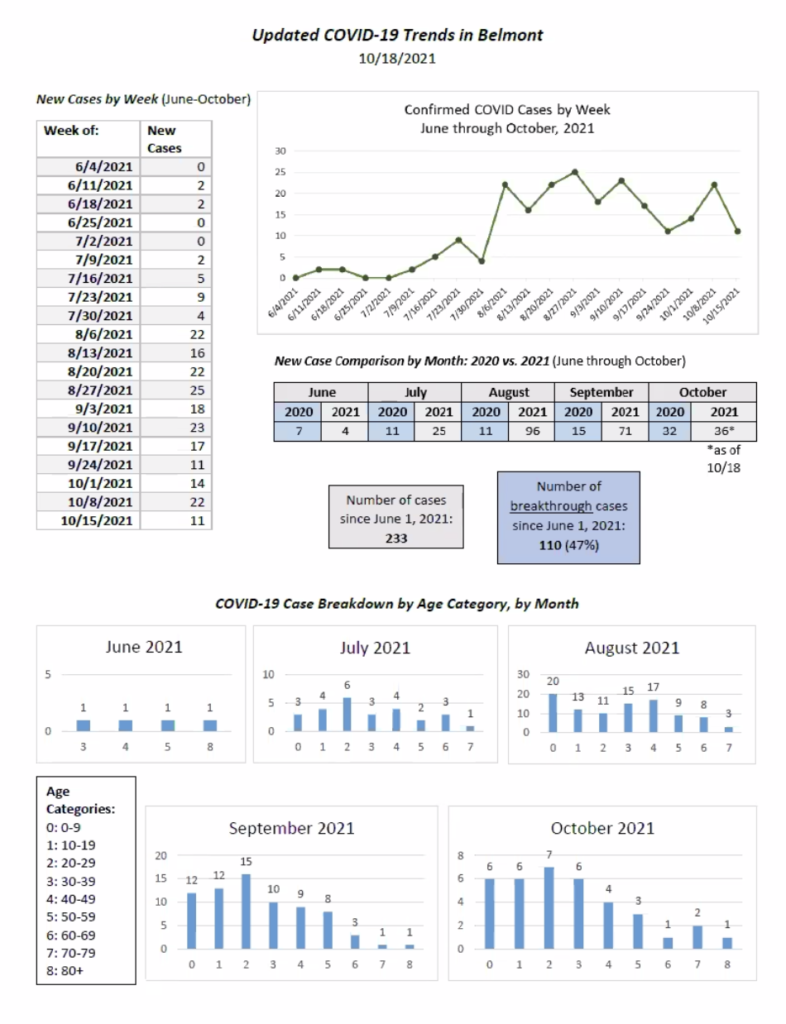Photo: Vaccination is a requirement for town employees
The Belmont Select Board voted unanimously Monday night, Oct. 18 to mandate all town employees to be vaccinated for Covid-19.
But the requirement will likely take at least a month, if not longer, before it goes into effect as the town must complete impact bargaining with the seven labor unions representing the 300 full- and part-time municipal employees. During those talks, it will be determined what administration action will be taken against workers who remain unvaccinated.
“This is a public health emergency,” said Select Board Chair Adam Dash before the vote. “I think [the board] need[s] to stand strong and do the right thing.”
“The goal here is for people to get vaccinated and stay employed. They’ve sacrificed quite a lot in their lives to [be in public service] and this is one of those things for the greater good,” Dash said.
The town mandate comes after the Belmont School Committee approved an agreement on Sept. 10 with the Belmont Education Association to require teachers and school staff to be vaccinated.
Spurring the board’s vote was the lastest data on Covid-19 infection rates in Belmont. Data (see at the bottom of the article) compiled by Public Heath Agent Lindsey Sharp showed higher 2021 infection rates than in the same month in 2020. For instance, while there were 11 new cases in August 2020, Belmont recorded 96 in 2021. And since June of this year, Belmont has seen 233 new cases, with nearly half being breakthrough cases occurring to residents who are fully vaccinated.
Sharp said the surge in the past few months are likely related to the highly virulent delta variant of the virus and the reopening of schools and businesses during the summer and fall. “There’s just more people out and about doing activities, traveling,” said Sharp.
In a voluntary survey of employees conducted by the town’s Human Resources Director Shawna Healey, a little more than a third participated of whom all said they have received at least one shot of the Covid-19 vaccine. The town’s Labor Counsel Brian Maser told the board it could require the other employees to provide their vaccination status by exercising its managerial prerogative as part of a vaccination mandate.
But even if the board went that route, “what does that get us?” said the Board’s Mark Paolillo. If, for example, 80 percent of employees are vaccinated, “what do we do with the other 20 percent?”
“I hate to mandate anything but these employees work for the town and we have to consider the safety of our residents,” said Paolillo. Saying there has been “chatter” on Facebook that the board is seeking to control worker’s lives, Paolillo “we’re just trying to protect the public.”
Vice chair Roy Epstein suggested a possible two track approach used at health sites such as the Boston Medical Center in which unvaccinated employees are required to be tested once or twice a week if they choose not to comply with notification requirements or outright refusal. But Paolillo countered that while religious or medical exemptions can be part of the measure, the board needed to take a strong stance on vaccinations.
“I just don’t think halfway [measures] helps anything. It’s either fully mandate or you don’t,” said Paolillo who backed Dash’s amendment.
The most notable of public comment came from resident Joseph Kelly who has questioned the vaccine mandates in Belmont at other venues, saying “there are a lot of things, short term and long term, that we don’t understand yet“ about the Covid vaccine, citing side effects to young recipients and a myriad of other issues. He also noted what he called the “Nuremberg Code” that he said that a person cannot be forced or coerced to be part of this “medical experiment” which, if the employee mandate is passed, would result in a person losing their job.
[Editor’s note: USA Today has produced a fact sheet on the Nuremberg Code and the misinterpretation of its main tenet.]
One area the board expressed concern was what to do with employees who flatly refuse taking the vaccine after an agreement is approved. While not wanting to fire an employee, Maser told the board it can follow the state’s mandate for its executive branch employees. Those who do not comply by a specific date would be placed “on leave” status when they would be required to use their accrued benefits charge, basically their holiday and other time off. When that is expired, those employees are not meeting the condition of employment and faces progressive discipline and ultimately termination.
Town Administrator Patrice Garvin said the practical issue facing the town is negotiating with seven unions who will could have different demands or requirements before signing an agreement with the town. Maser advised the board not to set a date certain that is at least four weeks from the vote for the mandate to take effect. It was agreed that after informing the unions of the vote on Tuesday, the board will meet in executive session next week with Garvin, Healy and Maser to discuss strategy relative to what the town’s proposal to bring to the bargaining table.
